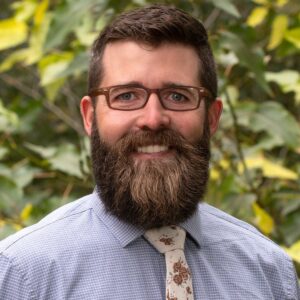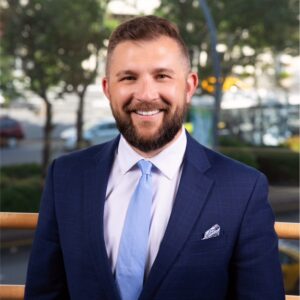Getting Residents Online: “We Will Get It Done”
| Getting residents online: “We Will Get it done” | By Linda Zinn, Managing Editor |
| contact with family, friends and ” cyberfriends” can be a real boost for residents here’s how one volunteer has made it happen. |
| “One man awake can awaken another, The second can awaken his next door neighbor.Three awake can rouse the town, And turn the whole place upside down. And many awake can raise such a fuss, That it finally awakens the rest of us. One man up with dawn in his eyes, Multiplies.” -Unknown |
| Bill Weisweaver is a man with “dawn in his eyes.” He envisions a time when every resident of a nursing home or assisted living facility who wants it-and even some who don’t yet know they want it-will have access to the “outside world” via e-mail and the Internet. Weisweaver, until recently a Florida long-term care ombudsman, was feeling alone three years ago after the loss of his wife and looking for something to do.He found something to do that changed his life: He discovered computers and turned one on for the first time at age 78. Soon afterward, he was talking with a resident in a nursing home who mentioned that her son was going to computer school and wanted to send her e-mail. He thought, “Why shouldn’t people in nursing homes have the ability to e-mail their families and friends?” Today he’s leading a grassroots campaign to stimulate communication via the Internet-between residents and their families, among residents of long-term care facilities across the country, and between residents and the community at large. A lofty goal? Maybe, but this U.S. Army veteran of World War II and the Korean and Vietnam wars is not easily backed down. Weisweaver says, “I don’t think there’s an obstacle to getting residents online that I haven’t already encountered. There’s always a way to solve a problem.” This energetic volunteer says he’s encountered and solved them all: ‘ “There’s no budget for computers.” ‘ “We don’t have the personnel to help with a program like that.” ‘”There’s no money to pay for the Internet connection.” ‘”There’s no room for a computer for residents.” |
| Some people contend that nursing home residents are “too far gone mentally” to benefit from having Internet access. Weisweaver disagrees: “Of course there are some residents who can’t be reached, but they all deserve a chance for someone to try. I feel that no one can sort out 100% of the ‘unreachables,’ so if we stop trying to each as many as is humanly possible, we’re in a sorry state. Obviously, some residents can’t or won’t participate in this program, but I do everything I can to arouse the interest of those who can. None of us knows who we can reach until we stick out a hand.” As a state ombudsman, Weisweaver was already acquainted with many administrators in his area, which opened the door for him to share his vision. “Whenever I’ve been able to convince an administrator to let me try this program for just three months-at no cost to their facility-seeing what it does for the residents has convinced them to continue the program,” Weisweaver says. So far nine Tampa-area nursing homes and two assisted living facilities have come on board. When it’s practical, Weisweaver likes to find a resident willing to serve as the “e-mail courier,” delivering printouts of incoming e-mail messages or reading them to fellow residents, and helping activities staff with sending their replies. Not only do the other residents benefit, but so does the “courier,” in gaining a sense of purpose and the appreciation of his or her neighbors. Sometimes there isn’t a resident capable of helping with e-mailing, and the activities director or administrator fills this role. At one facility, for instance, the activities director does the e-mail sending (of messages residents have dictated to her) and receiving at home, on her own time, and delivers incoming messages the next day. Other activities directors input the e-mail messages at the computer while residents sit and dictate their messages. And sometimes residents who aren’t too “technophobic” sit at the key- board and do their own e-mailing. Weisweaver says that although the approaches vary, the outcome is always the same: Residents benefit from this newfound avenue of human interaction. “This man had just about given up on life. He had become bed-bound and refused to eat at his scheduled mealtimes. He was reacting to his sense of being isolated from the world around him. I heard through the grapevine that he had once been a ham radio operator d casually mentioned to him one day that the Internet allows people around the world to communicate in much the same way as ham radio. That piqued his interest. This resident now has several pen pals around the world with whom he exchanges e-mails and photos. He no longer demands to stay in bed. He’s up and down the halls in his wheelchair, smiling and returning smiles, and he’s eating his three meals a day.” Not everyone jumps right into sending or receiving e-mail, Weisweaver says, but even residents who don’t e-mail can benefit from Internet access. He explains, “There is one gentleman who worked the carnival circuit as a ride operator and mechanic who entered a facility for hospice care last spring. He spoke to no one and was very lonely, because all his friends had gone north for the summer to work the fairs and carnivals. I saw him watching me work on a computer one day, and I asked him, ‘Where are you from originally?’ He told me, and I found his hometown newspaper for him on the World Wide Web. I showed him what the weather was like there and showed him a couple articles. That simple contact with his former hometown brightened his day. A few months later, he’s a different man, with an interest in what’s going on. I’m not saying that computer access is the cure for all disease, but it certainly takes residents’ focus off their illnesses and isolation and provides much-needed stimulation.” Isolation is one of the biggest challenges people living in nursing homes and other long-term care facilities face. Weisweaver says, “People often tend to put up walls and withdraw when they move into a facility. They’ve given up their home, their car, most of their belongings and even their right to go into debt to buy a TV-their whole life as they once knew it. And now ‘their space’ is often limited to half of a semiprivate room. They tend to be extremely protective of that space and can be very guarded in their interactions with other people. Often they feel that no one cares. Giving them a lifeline to their families and the community is one way we can coax them out from behind those self-imposed walls.” Getting computers into nursing homes and assisted living facilities is just part of Weisweaver’s master plan. He recently launched a new a Web site called Elders Communicating (www.elderscomm.com) to provide a forum for discussions and a place where members of the community can make contact with residents. The site includes an “Adopt-a-Grandparent” section, where people in the community can find pen pals from a list of interested residents, and a “Bulletin Board” for online discussions. Participants simply post messages or topics for discussion on the Bulletin Board, and others can read them and respond or start new topics. Another feature of the Elders Communicating Web site includes links to more than 2,400 newspapers across the United States so that residents, many of whom are originally from outside Florida, can see what’s happening in their hometowns. |
| Weisweaver also has in the works several special Web-based forums for groups of residents with a common bond-“fraternities” he calls them. He already has planted the seeds for a forum for residents who are quadriplegic, called “All Four,” by introducing participants to each other via e-mail. Other groups he has in mind are one for Resident Council members, one for younger nursing home residents and another for veterans who live in nursing homes. “There is a lot of camaraderie among the vets at Veterans Hospitals and other VA facilities, but that is lacking in other long-term care residences,” he explains. The Web site also includes a “Help Wanted” section where facilities anywhere in the United States can post requests for donations of computers, help from volunteers and anything else they might need, whether it is related to Internet access or not-for example, donated materials for crafts. This is not the first Web site Weis-weaver has built. The forerunner of elderscomm.com received a great deal of traffic and triggered communication among facilities and between residents and the community. But the company that originally volunteered to host and design the site for him was unwilling or unable to add the “fraternity” forums, so he decided to start over and build a site that would more completely fill the needs of the residents he serves. Besides alleviating residents’ isolation, Weisweaver has another, longer-range, goal for his Internet-access and Web site efforts: to spark community interest in long-term care facilities and pave the way for face-to-face contact between community members and residents. He expects that in interacting with residents-whether via e-mail or in online discussions-people “outside” will form friendships with them, and that the natural next step will be visits. He says, “So many people have no knowledge other than the horror stories they hear in the news about nursing homes. When they visit someone they’ve become friends with online, they can see for themselves what these facilities are like-and many of them are very good. Being there, they will observe any problems and have a direct line to helping to solve them. The public will be involved, and they can serve as volunteers and advocates for residents.” Another benefit of getting residents online is that e-mail gives them something else to think about besides why they’re in a long-term care facility. Weisweaver often says, “In a nursing home there are four main topics of discussion: kidneys, bowels, appetite (or lack thereof) and medication.” He says, “This program gives them something else to focus on and talk about.” The 11 facilities where Weisweaver has helped to get residents online are all within a 50-mile radius of his Tampa, Florida, home. He has no delusions about being able to single-handedly institute such a program nationwide, but he’s hoping that news of his efforts will reach someone who has the resources and willingness to launch a broader effort. Meanwhile he’s keeping busy rebuilding computers, speaking to civic and service organizations to enlist their members’ help, and visiting nursing homes every day to try to make a difference in residents’ lives. Currently he’s in the process of installing voice-activated software that will enable those who are physically un-able to type on a computer keyboard to input their messages by speaking into a microphone. His schedule and pace would put most 40-year-olds to shame, according to those who have seen him in action. One of Bill Weisweaver’s mottos is “We will get it done.” The residents whose lives he’s touched thus far are living evidence of his unwavering commitment to do just that. |
| Comments From Facilities and Residents |
| From Mariner Health of Tampa (a skilled nursing and rehabilitation facility), Tampa, Fla. Patrick Davies, Administrator: “At the base of Bill Weisweaver’s heart is a desire for the best-not only for residents but for the long-term care industry, as well. He has two goals: to alleviate residents’ isolation and to get the community involved in hopes of countering the bad press they read about long-term care. He’s carried it out with determination and dedication, funding it himself and never giving up. He’s remarkable. Lorine C., Resident: “My name is Lorine C. I now live at Mariner Health of Tampa. I was a Nurse’s Assistant and an independent salesperson. Jean M., Resident: “My name is Jean M. I am 73 years old and am now blind. I am president of our Resident Council and rely on our vice-president to see for me, but I need no help in hearing and sensing things around me. Jimmy E., Resident: “I am 32 years old and quadriplegic. I have made cyber pen pals in California, Texas and locally. I spend many hours enjoying the letters I get to answer. Before I had this computer, there was nothing to do. Now I never want to give it up. Bill gave me this computer and has just taught me animation. From Woodbridge Nursing and Rehabilitation Center, Tampa, Fla. Kathleen Phillips, Activities Director: “I remember when one of our residents received e-mail from her granddaughter overseas [see Ruth H.’s comment below], with a photo of her new great-grandson attached. She was just amazed and delighted when that photo appeared on the screen. Many of our residents’ families don’t live in Florida. This is a wonderful way for residents to stay in contact with them, and it’s easier for the Activities staff than sitting down with pen and paper to help write a letter. Charles S., Resident: “I am learning to operate the computer so I will be able to contact other facilities. I am looking forward to interaction with other residents and members of Family [Resident] Councils.” Ruth H., Resident: “I can keep in touch with my family and friends who do not live in the state of Florida. I received my best e-mail ever in October. It was from my grand-daughter who lives in England, along with pictures of my great-grandchildren, one of whom was my recently born great-grandson whom I had never seen until that photo was sent to me. What a joy it was for me!” Ken M., Resident: “I have WebTV in my room, along with my own Web site. I am now working on learning how to operate the computer. I find it interesting. I enjoy reading e-mails from the many people who wish to become pen pals, who have the same interests. Mine is writing poetry.” |
Related Articles
Topics: Activities , Articles , Technology & IT











